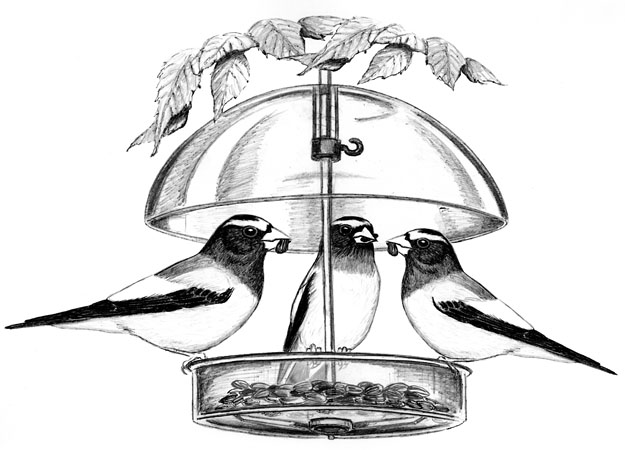
Dear Bird Folks,
I looked out my window this morning and saw an Evening Grosbeak eating on my feeder. They used to be quite common around here, but I haven’t seen one in years. Do you think they are coming back?
– Tor, Truro, MA
I sure hope so, Tor,
While I have yet to see one myself, I have been dreaming of the day when the Evening Grosbeaks return to Cape Cod. A coin collector may dream of finding a 1913 Liberty Head Nickel (worth five million dollars) or a stamp collector might hope to come across a Benjamin Franklin “Z Grill” postage stamp (worth three million), but for the lowly bird store owner the dream of all dreams is the return of the Evening Grosbeaks (worth untold gazillions in birdseed sales). The faint hope of these birds returning is the only thing that gets people like me up in the morning. Some folks think that hearing squirrel stories day in and day out is what keeps us going, but it’s really about the return of the Evening Grosbeaks. Oh, baby. That day can’t come soon enough.
What happened to the Evening Grosbeaks? Good question. One theory is that they’ve all been trapped in a gold mine in Chile, but actually, these birds are doing fine. They just have stopped coming to Cape Cod for some reason. Historically, this grosbeak was found in the western half of North America. In the early part of the twentieth century, huge numbers of them migrated east to take advantage of landscape changes caused by massive forest fires in Eastern Canada. They also benefited from outbreaks of spruce budworms in the Eastern forests. Spruce budworm infestations run in cycles, and while the worms are a big problem for the timber industry, the birds love them and are sure to show up whenever there’s an outbreak.
Evening Grosbeaks are large songbirds that at first glance look like goldfinches – goldfinches that have gotten into a jar of growth hormones. They are stout, compact, tough birds that could easily get a job as bouncers at any pub. The males are bright yellow and black, while the females are a soft silver and black. Their most prominent feature is the grossly disproportionate jumbo beak. This bird’s beak is large and powerful and can crack open the toughest seeds, including cherry pits. Yes, cherry pits. The same cherry pits that chip our teeth if we mistakenly bite down on one, are craved by the grosbeaks. Grosbeaks have been known to sit and patiently watch a flock of robins devour a tree of wild cherries. Eventually, the robins, which swallow the cherries whole, have to regurgitate the undigested pits. When that happens the grosbeaks swoop down and start chowing on the ABC (already been chewed) pits. Talk about being green. Eating spit-up cherry pits pushes recycling to the next level.
The other thing the birds can do with their huge beak is blast open sunflower seeds. In recent years many folks have been filling their feeders with hulled sunflower, but back in the ‘70s, when the Evening Grosbeaks dominated our feeders, sunflower seeds still had thick shells on them. These shells were no match for the grosbeaks. One snap of their immense beak and the seed was instantly opened. And man, these birds can eat. A single Evening Grosbeaks can eat up to twenty sunflowers in a minute. If you do the math correctly, you’ll realize that it takes a scant three seconds for the bird to select a seed, crack it open, spit out the shells and eat the food inside. Three seconds! That’s probably less time than it took you to read that sentence and way, way less time than it took me to write it. Now picture an entire flock of these flying seed-piranhas eating on the same feeder. When grosbeaks invade a birdfeeder shells fly everywhere and all the other birds, including the larger birds, get the heck out of their way. In fact, I’ve actually had squirrels call me up and ask how to keep grosbeaks out of feeders. (I knew I should have never given squirrels my phone number.)
Oddly, in spite of all their piggishness, few people ever complained about Evening Grosbeaks. The same people who grumble about Blue Jays, grackles and doves seemed to enjoy the raucous grosbeaks and I’m not sure why. Maybe back in the ‘70’s sunflower seed was a lot cheaper or perhaps folks ignored their brashness because Evening Grosbeaks were only here in the winter, when any form of life is appreciated.
I don’t know how old you are, Tor, but you are probably fairly young considering the average Truro resident is only around twenty-five years old (give or take fifty years). So you might not remember back when Evening Grosbeaks ruled our skies. It was a wonderful time, especially for those of us who sold sunflower seed (oh, baby). Unfortunately, Evening Grosbeaks are highly nomadic. They don’t necessarily return to the same area to breed each season and it’s anyone’s guess where they’ll spend the winter. For reasons that aren’t totally clear, Cape Cod has been off their list for over three decades. But maybe, just maybe, this will be the winter when the Evening Grosbeaks return. If they do, it will be a great winter for bird watchers and a better winter for my family. They are getting tired of porridge and beets for dinner every night. I don’t know what they are complaining about. It’s not like I give them beets that have been spit-up by robins. I’ve only done that a few times.